The president of the Legislature, Henry Kronfle, halted the session last week before voting and rescheduled for this Thursday the analysis of the bill, which encountered barriers to its approval due to some articles.
In the absence of agreements, the vote will probably be carried out in parts, Kronfle announced.
Much of the controversy was focused on the articles that propose allowing international entities attached to the inter-American system or the United Nations system, to review the sentences issued by the National Court of Justice, practically establishing the political return of former president Rafael Correa, as Jorge Peñafiel, assemblyman of the opposition movement Construye, considered.
Legislator Viviana Veloz, head of the Citizen Revolution bench – led by Correa – assured that this is not the intention; the problem lies in the lack of trust in judges who often give in to political pressure.
The bill proposes the classification of two new crimes: the spread of infectious diseases and femicide; the increase in penalties for crimes such as hiring or acting as hitmen, kidnapping, kidnapping for ransom, sexual extortion, drug trafficking, and violations against flora and fauna.
The reforms also seek greater sanctions for justice operators who act outside the context of the law, and public servants who commit embezzlement, influence peddling, and prevarication, among other behaviors.
Furthermore, the bill provides for expelling foreigners sentenced for crimes, and whose penalty exceeds five years in prison, once their term has been served, prohibiting them from returning to Ecuadorian territory for 20 years.
jrr/llp/npg/avr









